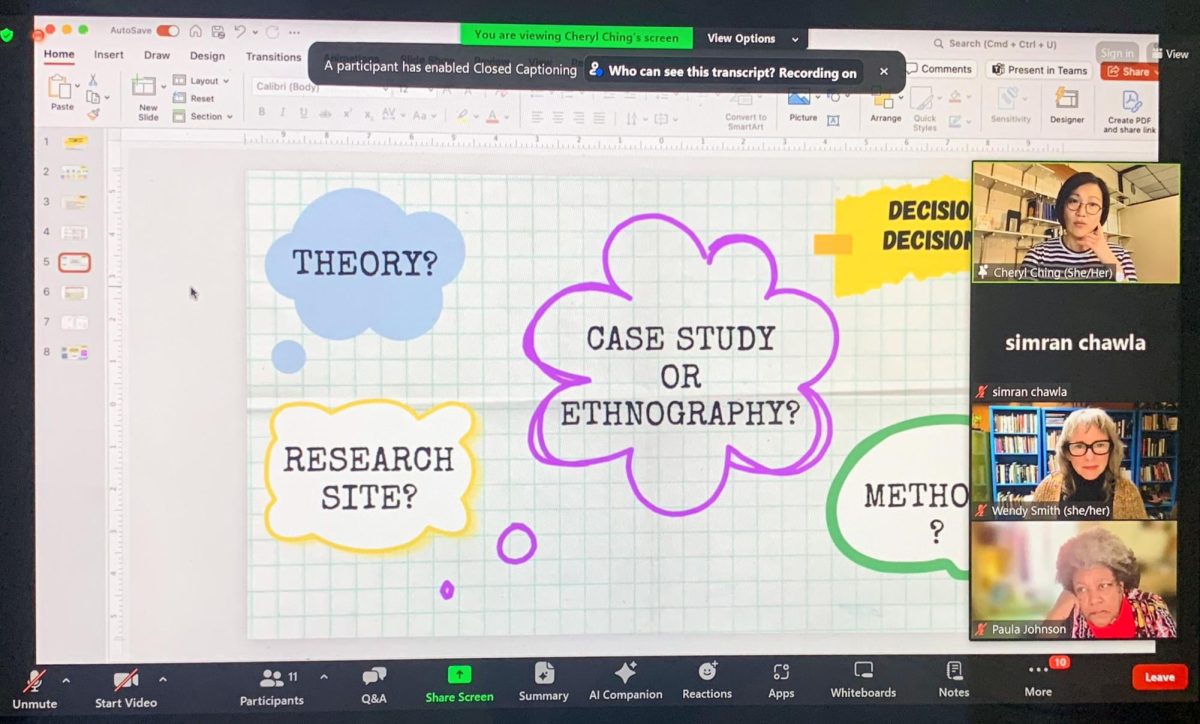A group of experts gathered for a discussion about ethnographic research. Dr. Cheryl D. Ching, who is an assistant professor in leadership in education at the University of Massachusetts Boston joined the panel along with Professor Wendy Smith who is the professor for English 101 courses, specializing in the theme of ethnographic writing within the English department of San Diego Mesa College and professor Katlin Choi from work-based learning at San Diego Mesa College. The discussion centered around ethnographic research, providing a platform for insightful conversations on qualitative methodologies and the systematic study of people and cultures.
Born and raised in the Philippines, Ching moved to the United States for college. Her research spans various areas, including educational equity, policy design and implementation, and qualitative research. Ching completed her master’s in Humanities and Social Thoughts from New York University in 2004 and her Ph.D. in Urban Education Policy from the University of Southern California in 2017.
Ethnography is a qualitative research method that involves the detailed and systematic study of people and cultures. It typically involves direct observation, participation, and interaction with the subjects in their natural environment to gain a deep understanding of their behaviors, customs, and social structures. Smith started the event by explaining the meaning of qualitative research, it is a method that explores and interprets human experiences, perspectives, and behaviors, providing in-depth insights into the complexity of social phenomena. Smith elaborated on the significance of qualitative research, by saying, “it is relevant to life and career because it prioritizes the experience, observational powers and diverse perspective.”
Dr. Ching expressed that as she was growing up, she was always aware of the noticeable differences and divisions between social classes. She highlighted that living in the Philippines, it is impossible to ignore the prevalence of inequality, emphasizing that it is a constant and everyday aspect of life in a society with clear social stratification.
In emphasizing the importance of ethnographic quantitative research, Dr. Ching highlighted the considerable emphasis on a mixed-methods approach. This involves integrating the immersive, qualitative aspects of ethnography with the structured, numerical analysis characteristic of quantitative research. Such an approach is designed to foster a more comprehensive understanding of a research problem or question by harnessing the strengths inherent in both methodologies. Dr. Ching also underscored the significance of learning through direct interactions with people, keen observations of individuals and spaces, and a thorough examination of pertinent documents.
During the discussion, Ching dispelled a common misconception that people have associated with the attainment of a Ph.D., saying that “there is a false belief that if you have done a Ph.D., you know how to research.” She elaborated on the continuous learning and adaptive nature of the research process that each project brings forth a unique set of questions and challenges that researchers must address and confront in meaningful ways. This involves engaging with the complexities of the research process in a manner that contributes to a deeper understanding of the subject matter, enriching the overall quality and impact of the research.
Ching reflected on her approach, noting that “with every new project, I use my knowledge and skills,” prompting her to reconsider past actions and decisions she made. She mentioned that her interdisciplinary and inclusive approach to knowledge creation contributes to a broader understanding of the complexities in education and equity.
Ching delves into the intricacies of creating fair and just educational opportunities. This exploration particularly emphasizes the thoughtful planning and execution of reforms, taking into account the dynamic interplay among three key elements: local actors (individuals and groups within a community who influence education), organizational conditions (internal factors like policies and culture within educational institutions), and reform designs (intentional plans to bring about positive changes in the educational system)
“Take as many method classes as you can,” advised Ching. Classes that organize and structure code by grouping together methods that operate on a common set of data or functionality.emphasizing the significance of using diverse research methodologies, that involves employing varied approaches and techniques to comprehensively investigate a topic. When Ching was in college, she said that these classes shaped her understanding of the world, language, and how individuals make sense of their surroundings during the research process.
Emphasizing the intrinsic connection between genuine interest and sustained motivation, Ching elaborated on the idea that selecting a research topic should be driven by genuine interest and passion. Engaging in research involves a significant amount of effort and time. Having a strong personal interest in the chosen topic can provide the motivation needed to sustain the hard work and challenges that come with the research process. Ching said, “you have to choose a topic you really want to get up and work on because there is a lot of work that goes into research.”
Transitioning seamlessly from this advice, Ching generously shared details about her ongoing research project. Most of her research is primarily centered in the California Community Colleges system. Currently, she is working on a mixed method team which is a team that combines qualitative and quantitative approaches to research or problem-solving. The research project is about Assembly Bill 705 that aims to improve community college placement policies and increase student access and success in California higher education and its impact on educational development within the Los Angeles Community College District. The project is structured as a collaborative research partnership, working closely with the District to thoroughly examine the policy’s implementation at both the district level and delving deeper into three specific colleges within that district.
One of the questions students asked was whether Dr. Ching’s work and research had an impact on policies and outcomes. In response, Ching mentioned that, as a researcher, they always aim to show the impact in every possible research project. She shared a specific example from a project in Colorado where she collaborated with a college math department. The project focused on analyzing syllabus artifacts which are tangible elements, such as assignment details and grading criteria, associated with a course syllabus and identifying teachers’ assumptions about the course. After the conclusion of the project, the department made significant changes to their syllabus.Ching expressed that all researchers hope their research work can leave a positive impact.


